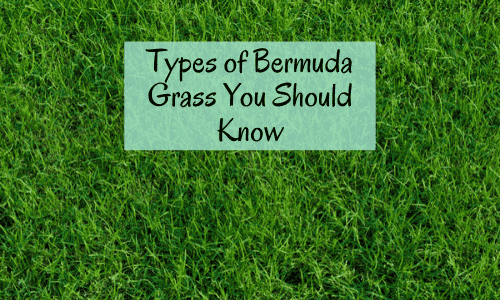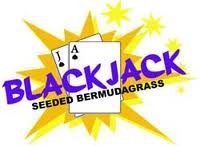Quick Answer
Without further ado, let’s take a look at these Bermuda grass types in detail.
Different Types of Bermuda Grass

There are two broad categorizations of Bermuda grass: Hybrid Bermuda and Common Bermuda.
Hybrid Bermuda grass includes Tif varieties, while common Bermuda grass typically comprises seeded varieties.
Let’s take a deeper look at each of these two types of Bermuda grass varieties below!
Common Bermudagrass
This variety is also called seeded Bermuda grass. It spots a light-green hue with a rough texture.
Despite having a lower shoot density when compared to hybrid varieties, common Bermuda grass boasts higher nutritional value, making it the most suitable for making forage and hay for livestock. It’s also great as turf grass, as its thick growth allows it to withstand high foot traffic.
However, common Bermuda grass is not great for lawns and public parks, which is where the improved common Bermuda seed varieties come in.
Due to their relatively deeper-rooted and denser growth, these improved varieties are a great alternative for heavily trafficked turfs. They can thrive on lawns, public parks, and even sports fields.
What’s more, they are cheaper to maintain compared to Hybrid Bermuda grass varieties.
Recommended Common Bermuda grass seed:
- Designed for full sun, high traffic areas, and drought resistance
- Exclusive 4 in 1 WaterSmart PLUS Coating absorbs more water, feeds with essential nutrients and protects seedlings from disease
- Includes Scotts best seed, protects against disease, keeps seed moist 2x longer & feeds to jumpstart growth for thicker, greener grass, guaranteed
Affiliate links and images pulled from the Amazon Product Advertising API on: 2024-04-17
Hybrid Bermuda grass

This variety also goes by the name ‘sterile vegetative hybrids’. It’s a cross-product of two grass species: common Bermuda and African Bermuda (Cynodon transvaalensis).
Hybrid Bermuda grass has to be developed using vegetative methods like sod, plugs, or sprigging; since it doesn’t produce seeds.
Each of these vegetative methods is explained below:
- Sods – this is where patches of grass are extracted from an existing turf and installed/planted in the desired area.
- Plugs – where seedlings are grown in trays and are then replanted in the desired bedding.
- Sprigging – whereby sections of grass- called sprigs- are installed.
Exceptions
There are a couple of exceptions to the seeded and hybrid Bermuda grass types including ‘Texturf 10’ and ‘Princess’. The former – for instance – can’t make seeds if isolated, but will do so if there’s pollen from any other type of Bermuda grass close by.
Affiliate links and images pulled from the Amazon Product Advertising API on: 2024-04-17
The ‘Princess’ – meanwhile – is a hybrid Bermuda variety that is unlike any other Hybrid Bermuda, in that it produces seeds. However, it can be easily differentiated from seeded varieties since it spots a darker color with a softer texture.
What is the best type of Bermuda grass for golf greens?
Golf courses typically call for hardy, fast-healing grass varieties; characteristics that most Bermuda grass varieties bear. That’s why I love Blackjack Bermuda for golf greens.
Blackjack Bermuda Grass

Get Blackjack Bermuda Seed Here
- Bermuda is a blend of drought tolerant, durable turf types
- Works well in a broad range of soil types
- Stands up well to foot traffic
Affiliate links and images pulled from the Amazon Product Advertising API on: 2024-04-17
Over the years, several Bermuda grass varieties have come to be acknowledged by turf professionals as the go-to option for golf courses. This, is mostly due to their capability to withstand drought and wear.
See also my detailed article on the golf course grass used by professionals.
Below, is a detailed overview of some of the best types of Bermuda grass that you might want to consider if you’re a homeowner establishing a new lawn or if you are the maintenance manager at your local golf club.
Blackjack Bermuda grass is one of the most preferred varieties of this grass type. It is known for its dense coverage, making it one of the best grass seeds for areas with frequent foot activity.
But why is blackjack Bermuda grass preferred to the other varieties? For starters, it is one of those cultivars that remain dark green and vibrant during the months of summer.
Here’s what to expect from the Blackjack Bermuda grass variety:
- Thick and full density to a carpet-like feel
- Great tolerance to shade
- Drought tolerance
- Cold tolerance
- Great seeding success and germination rate
- Very fine texture for better drought resistance
This variety of Bermuda grass does well when planted on well-drained soil. While it is a grass type with great shade tolerance, it is best grown in full sunlight. If you’re planning to seed your lawn with Blackjack Bermuda grass, do it when the soil temperature is around 65 °F and at a rate of 2-3 lbs per 1,000 sq. feet. Read more about blackjack Bermudagrass.
Bermuda Grass Type Buyers Guide
If you are not sure what type of Bermuda is best for your home lawn, the guide below will go over popular varieties that are most common in home yards.
Best Bermuda Grass Type for Home Lawns

When it comes to lawns, aesthetic appearance, and ability to resist lawn diseases should be the first two decision-making considerations whenever you’re looking to upgrade the turfgrass in your backyard. But, before you plant Bermuda grass of any type, be sure to have good irrigation in place.
As such, Hybrid Bermuda varieties are the best since they spot the distinctive appearance of common Bermuda grasses, while also experiencing fewer disease issues than other Bermuda grass types.
The only downside perhaps is that they require more proper lawn care if you wish to maintain your backyard’s beautiful appearance. Here’s a rundown of some of the best Bermudagrasses for the home, all of which are hybrid varieties that thrive on lawns.
TifWay 419

This is my go-to Tiflawn blend for home lawns. It grows quickly and fills in rather thick. It’s a great blend for dogs or where there is heavy usage as it’s very resilient and grows back faster than other Bermuda types.
Tifway 419 is also very durable with disease resistance and you can mow closer to the ground with it and it will thrive. Did you know that TifWay 419 also provides excellent disease and weed resistance?
TifSport
Released in 1997, this hybrid’s desirable characteristics include its superior turf texture and density. What’s more, TifSport Bermuda grass is fairly cold-tolerant and winter-hardy.
TifSport turfs can only be produced by vegetative propagation, as it doesn’t produce seeds.
Tifway II
This is an improvement on the original Tifway Bermuda grass. Tifway II is reported to exhibit better tolerance to frost and nematode. In terms of physical appearance, this Hybrid Bermuda grass boasts high shoot density.
TifGrand
This hybrid Bermuda variety is great for lawns due to its capability to maintain its beautiful leaf appearance even when soil conditions deteriorate. TifGrand Bermuda grass is known to better retain its lush green leaf-blade hue, even under insufficient nitrogen conditions.
This hybrid Bermuda grass doesn’t produce pollen and is more disease-resistant than most common Bermuda grasses.
What’s more, TifGrand grows relatively faster and is highly shade-tolerant. Lawn-care experts recommend mowing for TifGrand lawns once they grow to a height of about two inches. TifGrand also goes by the commercial name- PP21017.
Other Bermuda Grass Types
Yukon
- Yukon Bermuda grass seed is the best choice for turf managers needing an exceptional seeded Bermuda grass, no matter what Bermuda growing zone they are in worldwide! Yukon was developed by the Oklahoma State University Turfgrass Research Team, in conjunction with the USGA.
- This Bermuda turf grass seed is a synthetic variety produced by the inter-crossing of five parental plants that were selected in 1990 from a cold hardy study, based on high turf quality - making it the most cold tolerant Bermudagrass.
- Yukon is the most dramatic improvement in seeded Bermudagrass varieties to date. It is the pick of Outsidepride for the best quality Bermuda grass lawn seed based on available NTEP data.
Affiliate links and images pulled from the Amazon Product Advertising API on: 2024-04-17
This fine-blade Bermuda grass variety is one that you’ll find on many golf courses across the globe. It boasts a lush green hue that makes it visually appealing. Since it’s a lower-growing variety, Yukon grass is usually mowed at about 1/4 inches.
With a seeding rate of about 2-3 pounds per 1000 square feet, this Bermuda grass variety is a perfect fit for turf application. Given the appropriate levels of soil temperature, moisture, and nutrients, Yukon Bermuda grass will sprout within 7-10 days.
It starts forming its rhizome system from the sixth to the eighth week after seeding, whereby a thick turf is formed. Yukon turfs typically become ready to be played on after 60 days especially if you feed it with the best fertilizer for Bermudagrass lawns.
Oasis blended Bermuda grass
- Bermuda grass is a warm season grass used in Southern states
- Oasis bermuda grass seed is a blend of three of the leading bermuda grasses
- Bermuda is a fast growing, aggressive grass which can crowd out weeds
Affiliate links and images pulled from the Amazon Product Advertising API on: 2024-04-17
This variety is a cross of various improved common Bermuda grass types, hence its relatively higher genetic diversity and broader adaptation spectrum.
Such seed blends tend to exhibit the desirable characteristics of their component varieties while having less of the individual varietal shortcomings.
According to research, Oasis’ turf superiority/quality exceeds that of common Bermuda grass by up to 20%. As such, turfgrass specialists recommend it for use on golf course fairways and tees.
Here’s a detailed list of the desirable characteristics of the Oasis Bermuda Blend:
- Lush green-light green color.
- Medium soft to medium-coarse blade texture.
- Short-medium tall height.
- Excellent traffic tolerance.
- Fairly good drought tolerance.
- Satisfactory – good cold tolerance.
Best Types of Bermuda Grass for Hay
Forage Bermuda grass varieties can withstand the ups and downs that come with hay production – as it’s a perennial grass. Different Bermudagrass cultivars boast different desirable qualities, all of which make them suitable for hay production.
Below are some of the best Bermuda grass varieties for hay production!
Tifton 85
Tifton 85 is a cross between Tifton 68. It is a cold-tolerant South African Bermuda variety. Since Tifton 68 is highly digestible but exhibits poor cold tolerance, its hybrid version, Tifton 85 exhibits the desirable characteristic, while also masking the unwanted characteristic.
The most common and popular method for establishing Tifton 85 is by sprigging. In hay production, yield quantity is a significant success factor, and Tifton 85 excels in this regard.
With broad leaves and large stems, this Bermuda cultivar is known to produce the highest yields and digestibility among the recommended Bermuda grass varieties for hay production.
Russell
This winter-hardy Bermuda grass type is also a favorite amongst hay producers. Under sufficient moisture conditions, Russell has been known to produce yield quantities comparable only to the aforementioned Tifton 85.
This Bermuda variety also exhibits relatively denser, but shorter forage upon maturity. Russell is also simpler and faster to establish than Tifton 85. It can be established by sprigging.
Coastal Bermudagrass
This hybrid forage Bermuda grass variety is a hay production mainstay. In Southern USA, an estimated 15 million acres of hay and pasture land comprises Coastal Bermuda grass. Being as it’s a tall-growing variety, Coastal has been known to produce double the amount of forage typically produced by most common Bermuda grasses.
Its forage quality also tends to be quite superior in comparison to most common Bermuda types.
Related Posts
How To Get Bermuda Grass To Spread Fast?
Hi, Alex Kuritz here. Growing up I remember that my family had one of the best lawns in the neighborhood. Richly green and lush. I did a lot as I grew up in terms of caring and tending for not only my family’s lawn but also my neighbors. I can say I have years of experience, and I am here to share it with you.








It’s interesting that Bermuda grass requires proper lawn care and good irrigation. I’m wanting to add new grass, preferably turf, to my home lawn this year so it looks amazing. I’ll be sure to research different types of turf to see what looks the best for my lawn.
I just spread yukon on my yard today hoping for good results
My yard was sodded ten years ago with Tifway 419. Common Bermuda has invaded in large areas. I’ve been told to scalp the invaded areas with a string trimmer, then use an edger to cut into the soil at 2” intervals and then heavily spread Yukon grass seed. I’ve been told I have a good chance of the new grass choking out the common since the common has been stunned and then the Tiffany will eventually choke out the Yukon in a few years. I’ve been told that Yukon looks more like Tifway 419 than any other. Do you agree? Other comments?
That sounds like a plausible plan. Ya, most don’t realize how bad common Bermuda looks and just pick up seed at the big box store. That’s what I did decades ago before realizing that there was a difference in Bermuda grasses.